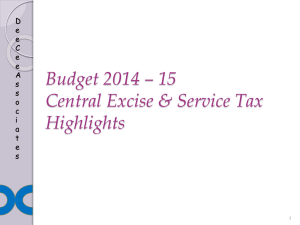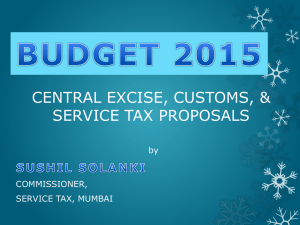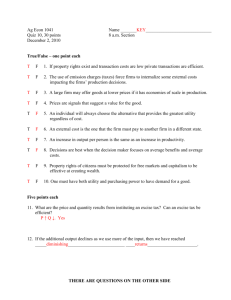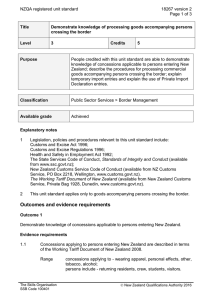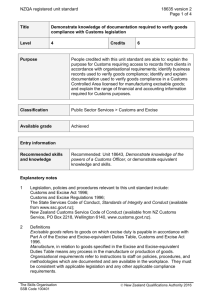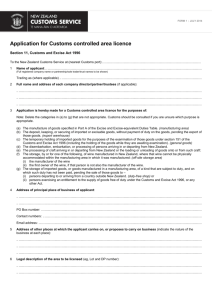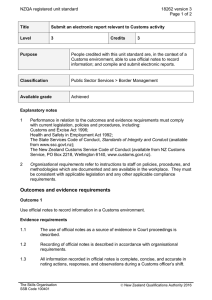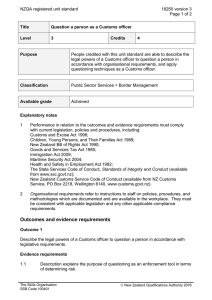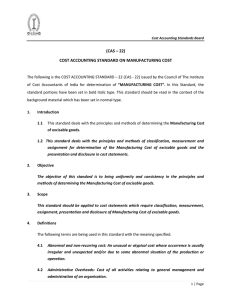NZQA registered unit standard 18634 version 2 Page 1 of 3
advertisement
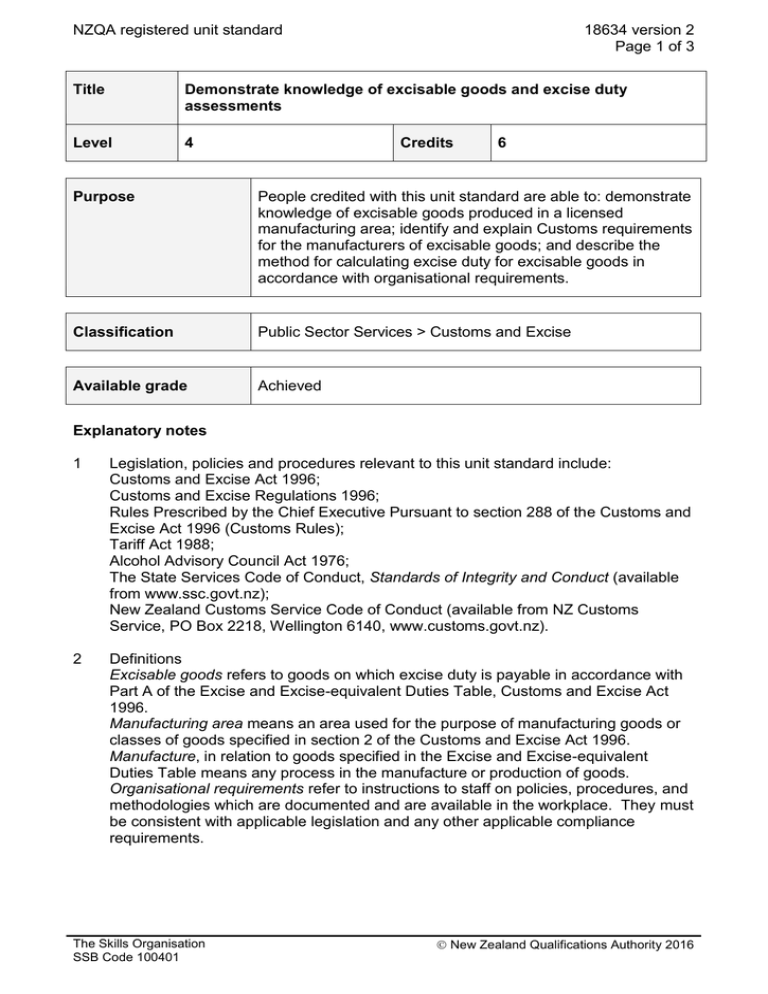
NZQA registered unit standard 18634 version 2 Page 1 of 3 Title Demonstrate knowledge of excisable goods and excise duty assessments Level 4 Credits 6 Purpose People credited with this unit standard are able to: demonstrate knowledge of excisable goods produced in a licensed manufacturing area; identify and explain Customs requirements for the manufacturers of excisable goods; and describe the method for calculating excise duty for excisable goods in accordance with organisational requirements. Classification Public Sector Services > Customs and Excise Available grade Achieved Explanatory notes 1 Legislation, policies and procedures relevant to this unit standard include: Customs and Excise Act 1996; Customs and Excise Regulations 1996; Rules Prescribed by the Chief Executive Pursuant to section 288 of the Customs and Excise Act 1996 (Customs Rules); Tariff Act 1988; Alcohol Advisory Council Act 1976; The State Services Code of Conduct, Standards of Integrity and Conduct (available from www.ssc.govt.nz); New Zealand Customs Service Code of Conduct (available from NZ Customs Service, PO Box 2218, Wellington 6140, www.customs.govt.nz). 2 Definitions Excisable goods refers to goods on which excise duty is payable in accordance with Part A of the Excise and Excise-equivalent Duties Table, Customs and Excise Act 1996. Manufacturing area means an area used for the purpose of manufacturing goods or classes of goods specified in section 2 of the Customs and Excise Act 1996. Manufacture, in relation to goods specified in the Excise and Excise-equivalent Duties Table means any process in the manufacture or production of goods. Organisational requirements refer to instructions to staff on policies, procedures, and methodologies which are documented and are available in the workplace. They must be consistent with applicable legislation and any other applicable compliance requirements. The Skills Organisation SSB Code 100401 New Zealand Qualifications Authority 2016 NZQA registered unit standard 18634 version 2 Page 2 of 3 Outcomes and evidence requirements Outcome 1 Demonstrate knowledge of excisable goods produced in a licensed manufacturing area. Range alcohol, tobacco, petroleum products. Evidence requirements 1.1 The principal materials and processes used to manufacture excisable goods are identified. 1.2 The movement of excisable goods between manufacturing areas and the duty liability applicable when moving such goods is explained in accordance with Customs and Excise Regulations 1996. Range 1.3 supply of services from another location, transportation, transfer of materials and manufactured goods, goods for export, approved purposes. Areas of potential loss during the manufacturing process are identified. Outcome 2 Identify and explain Customs requirements for the manufacturers of excisable goods. Evidence requirements 2.1 The requirements for Customs permits and approvals for the use of duty free ethyl alcohol and alcoholic beverages are identified and explained. Range purchase, possession, duty free use, records. 2.2 Excise duty on products defined by Part A of the Excise and Excise-equivalent Duties Table, Customs and Excise Act 1996 is identified. 2.3 The requirement of a manufacturing area licence holder to provide payment returns when due is explained. Range includes but is not limited to excise payment obligations. 2.4 The taking of samples for Customs purposes from a licensed manufacturing area is explained. 2.5 The basis for drawbacks and refunds and the procedures involved in their processing are identified. Outcome 3 Describe the method for calculating excise duty for excisable goods in accordance with organisational requirements. The Skills Organisation SSB Code 100401 New Zealand Qualifications Authority 2016 NZQA registered unit standard 18634 version 2 Page 3 of 3 Evidence requirements 3.1 The method for calculating the excise duty on alcohol is described. 3.2 The method for calculating the excise duty on tobacco products is explained. Range tobacco, cigarettes, cigars. Status and review information Registration date 16 July 2010 Date version published 16 July 2010 Planned review date 1 February 2015 Accreditation and Moderation Action Plan (AMAP) reference 0121 This AMAP can be accessed at http://www.nzqa.govt.nz/framework/search/index.do. Please note Providers must be granted consent to assess against standards (accredited) by NZQA, or an inter-institutional body with delegated authority for quality assurance, before they can report credits from assessment against unit standards or deliver courses of study leading to that assessment. Industry Training Organisations must be granted consent to assess against standards by NZQA before they can register credits from assessment against unit standards. Providers and Industry Training Organisations, which have been granted consent and which are assessing against unit standards must engage with the moderation system that applies to those standards. Consent requirements and an outline of the moderation system that applies to this standard are outlined in the Accreditation and Moderation Action Plan (AMAP). The AMAP also includes useful information about special requirements for organisations wishing to develop education and training programmes, such as minimum qualifications for tutors and assessors, and special resource requirements. Comments on this unit standard Please contact The Skills Organisation info@skills.org.nz if you wish to suggest changes to the content of this unit standard. The Skills Organisation SSB Code 100401 New Zealand Qualifications Authority 2016
